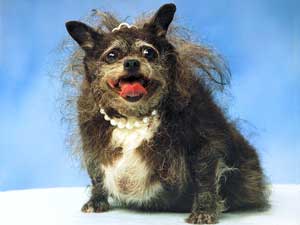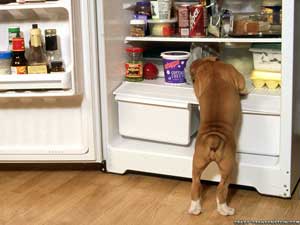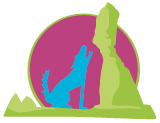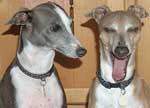Canine Obesity – A Big Fat Problem
by Kaye Davis of Moab BARKery
Canine obesity is an important - and very common - medical condition with serious health implications. The American Veterinary Medical Association (AVMA) has estimated that there are 41 million pet dogs in the United States and some sources suggest that 40%, approximately 17 million, of these dogs are overweight or obese. It’s easy to tell when you have added a few pounds, that favorite pair of jeans gets a little too snug; unfortunately, it is not as obvious with your dog. Most owners do not even know when their dogs are overweight.
According to the AVMA only 17% of owners believe their dogs have a weight problem, whereas vets reported that 47% of their client’s dogs are overweight. The reason for the distortion could be that since almost half of all dogs are overweight or obese, fat dogs are beginning to look more like the rule than the exception. Heavy dogs are becoming the “norm,” making dogs at a healthy weight appear under nourished.
 You can tell that your dog is overweight or obese if cannot feel their ribs or spine beneath their fat deposits, their fat deposits extend to the chest or tail and hindquarters. An obese dog will also have a waist that is distended or pear shape when viewed from above and an abdomen that sags when viewed from the side. Common health problems that occur in overweight and obese dogs are diabetes, joint problems, osteoarthritis, respiratory disorders, high blood pressure, heart disease, kidney and liver problems and cancer. If you are not sure if your dog is overweight or not you should consult your vet. You can tell that your dog is overweight or obese if cannot feel their ribs or spine beneath their fat deposits, their fat deposits extend to the chest or tail and hindquarters. An obese dog will also have a waist that is distended or pear shape when viewed from above and an abdomen that sags when viewed from the side. Common health problems that occur in overweight and obese dogs are diabetes, joint problems, osteoarthritis, respiratory disorders, high blood pressure, heart disease, kidney and liver problems and cancer. If you are not sure if your dog is overweight or not you should consult your vet.
What is causing this obesity epidemic in our canine companions? The biggest contributor is that the majority of commercially available food produced by the pet food industry is made with no regard to the biological needs of your dog. While it is true that more holistic and biologically appropriate dog foods are available today, the reality is that these barely represent 10 percent of what is available on the market. The companies making these foods are the small players in the market.
The large companies that represent the other 90 percent of dog food sold in this country are not interested or motivated in creating nutritiously sound food for your dog; they are interested in developing marketable and profitable products. What that means for you as a consumer is that 90 percent of foods available commercially contain ingredients that are highly inappropriate for your dog but are also loaded with salt, sugar and fat.
Most owners that know that their dog is overweight or obese want to do something about it but many owners are getting bad advice about how to slim down their portly pets! Most people think that it is as easy as feeding their dog a low fat or diet formula and the pounds will drop off. However, the formulation of low fat and diet formulas available for dogs are NOT based on their biological or nutritional needs and this is why diet or low fat formulas can actually cause weight gain.
 The first thing fat dog owners need to understand is that “low fat” food is “high carbohydrate” food. Carbohydrates added to commercial pet foods include corn, wheat, soy, rice, potato and oatmeal. Although these starches are low in fat they are high in calories and unless these extra calories are burned away through exercise it will be deposited as fat. Adding excessive amounts of carbohydrates to diet foods also means that other vital nutrients are displaced, the main one being protein. Most low fat diets are 80 percent carbohydrates and 20 percent protein; some of the worst offenders are 90 percent carbohydrates. The first thing fat dog owners need to understand is that “low fat” food is “high carbohydrate” food. Carbohydrates added to commercial pet foods include corn, wheat, soy, rice, potato and oatmeal. Although these starches are low in fat they are high in calories and unless these extra calories are burned away through exercise it will be deposited as fat. Adding excessive amounts of carbohydrates to diet foods also means that other vital nutrients are displaced, the main one being protein. Most low fat diets are 80 percent carbohydrates and 20 percent protein; some of the worst offenders are 90 percent carbohydrates.
Ten or even 20 percent protein is not enough for your carnivorous dog. Carnivores are designed by nature with a high protein requirement, as it is the essential fuel that is required by your dog. When your dog is protein deprived eventually they will develop symptoms of a serious nutritional deficiency which manifest in an increase in weight, flaky skin and nails, poor muscle tone and dry, dull and brittle coat with patchy hair loss.
Diet foods also contain a high level of fiber as well; the idea behind this being that it will make your dog feel full. However, what it really does is cause your dog to poop excessively whilst blocking the absorption of healthy nutrients in the small intestine. Fiber may make your dog feel temporarily full but in reality all it is doing is creating chronic deprivation of nutrients at the cellular level, constant hunger and protein deficiency. Next to water, protein is the most important nutrient required by your carnivorous dog and when their cells are deprived of it a host of negative side effects can occur.
So how do you help your fat dog? The best way to keep your pet healthy is to prevent them from getting fat in the first place. However if you already have a porky pooch, here are some tips for helping them slim down…
Practice Portion Control - Remember that regardless of their weight, your dog still needs a diet high in protein. Feed your dog a high protein, low carbohydrate diet and moderate the portions to control the amount of calories they are consuming. Obviously, you can’t serve an all-day, all-you-can-eat buffet to an overweight pet so have scheduled feeding times in the morning and evening.
Exercise With Your Dog - An overweight body slims down by moving more and eating less. So along with calorie restriction through portion control, it’s also really important that you set up a good exercise program for your dog. Daily aerobic activity is one of the best ways to build muscle tone, and muscle tone decreases the amount of fat that your dog carries around. Muscle mass also increases metabolism, which helps burn calories and not just the dog’s calories.
Minimize The Treats - You can still give your dog treats, but make them protein-based and feed very small amounts at scheduled times throughout the day. Make sure to include the calories in treats as part of your portion control plan.
There’s not a single more important step you can take for your pet’s longevity and quality of life than to help your best furry friend achieve and maintain a healthy weight..
|
 You can tell that your dog is overweight or obese if cannot feel their ribs or spine beneath their fat deposits, their fat deposits extend to the chest or tail and hindquarters. An obese dog will also have a waist that is distended or pear shape when viewed from above and an abdomen that sags when viewed from the side. Common health problems that occur in overweight and obese dogs are diabetes, joint problems, osteoarthritis, respiratory disorders, high blood pressure, heart disease, kidney and liver problems and cancer. If you are not sure if your dog is overweight or not you should consult your vet.
You can tell that your dog is overweight or obese if cannot feel their ribs or spine beneath their fat deposits, their fat deposits extend to the chest or tail and hindquarters. An obese dog will also have a waist that is distended or pear shape when viewed from above and an abdomen that sags when viewed from the side. Common health problems that occur in overweight and obese dogs are diabetes, joint problems, osteoarthritis, respiratory disorders, high blood pressure, heart disease, kidney and liver problems and cancer. If you are not sure if your dog is overweight or not you should consult your vet. The first thing fat dog owners need to understand is that “low fat” food is “high carbohydrate” food. Carbohydrates added to commercial pet foods include corn, wheat, soy, rice, potato and oatmeal. Although these starches are low in fat they are high in calories and unless these extra calories are burned away through exercise it will be deposited as fat. Adding excessive amounts of carbohydrates to diet foods also means that other vital nutrients are displaced, the main one being protein. Most low fat diets are 80 percent carbohydrates and 20 percent protein; some of the worst offenders are 90 percent carbohydrates.
The first thing fat dog owners need to understand is that “low fat” food is “high carbohydrate” food. Carbohydrates added to commercial pet foods include corn, wheat, soy, rice, potato and oatmeal. Although these starches are low in fat they are high in calories and unless these extra calories are burned away through exercise it will be deposited as fat. Adding excessive amounts of carbohydrates to diet foods also means that other vital nutrients are displaced, the main one being protein. Most low fat diets are 80 percent carbohydrates and 20 percent protein; some of the worst offenders are 90 percent carbohydrates. 



 My Pet’s Friend
My Pet’s Friend